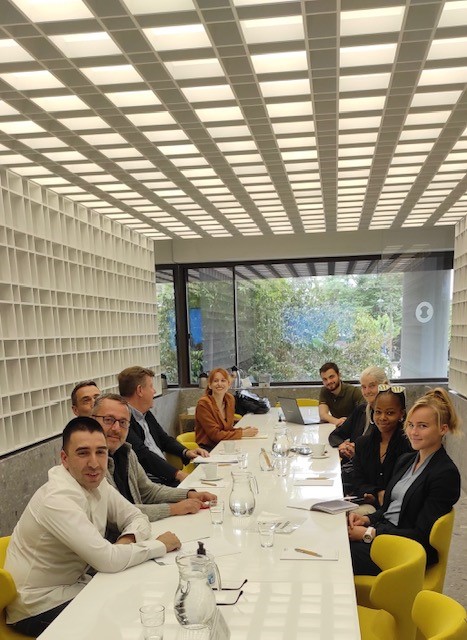On May 18, a Roundtable discussion with a delegation of academics and collaborators of the University of Pretoria was held at ELIAMEP. ELIAMEP was represented by Professor Spyros Blavoukos, Professor Panagiotis Tsakonas, Ronald Meinardus, Pavlos Petidis, Junior Research Fellow and Aphrodite Sentoukidis, MA Athens University of Economics and Business. The University of Pretoria was represented by Emeritus Professor of International Relations Maxi Schoeman, Lecturer Anthony Bizos and University of Pretoria postgraduate students Daniela Margraff and Joanna Ramachela Tshegofatso.
While the BRICS engage in efforts to expand their economic and political footprint in the wider Western Indian Ocean, Gulf of Aden, and Arabian Gulf region, the link between the BRICS and North Africa is significantly affecting the future of the Mediterranean Sea as a zone of stability, as BRICs reach out to this region through a potential expansion of membership. From the EU’s perspective, BRICS is viewed both as a rival and an intriguing alternative to the Southern Neighborhood nations for the following reasons: (i) BRICS offers a new ideological basis problematizing the predominant status quo based on traditional powers, (ii) BRICS advocates for the reform of the current architecture of global governance by uploading in the global agenda their national preoccupations and (iii) BRICS challenges United States (US) hegemony by adhering to a multipolar world. Αny potential expansion in BRICS membership (for example, Egypt, Turkey, Morocco, Algeria) raises concerns about the EU’s response, the implications on the security and energy landscape, and the response of the West, especially that of the NATO front-line states. Considering these issues and challenges, the discussion focused predominantly, although not exclusively, on BRICS as a common denominator of research emphasis with questions arising as to whether BRICS is or should be seen as a “change” and not a “challenge”, an “ally” and not a “competitor”. From a regional perspective it was noted that BRICS can be approached through the lens of overlapping regionalism and research can be directed at analysing possible nested regimes. Along with this, the significance of intra-BRICs relations and bureaucratic politics were also emphasized. Another aspect discussed was the governance of global commons, such as Arctic Circle and the Exploration and Use of Outer Space. The emerging importance of BRICS can thus stimulate research interest on the bilateral relations of Europe-South Africa through comparisons between the Eastern Mediterranean and the Indo-Pacific regions. A schedule of specific actions was defined where the two parties will work together to produce research material on the topics agreed upon during the discussion.






